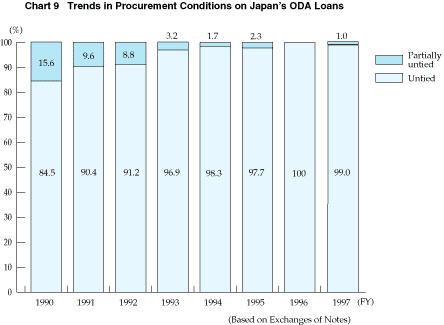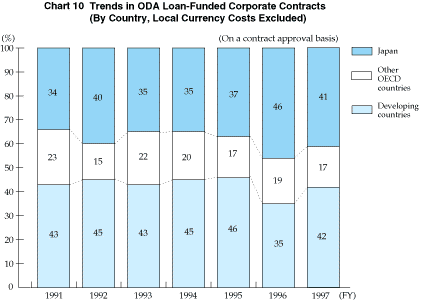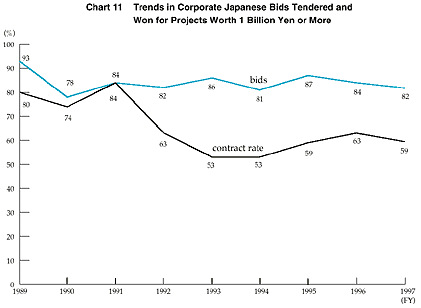Official Development Assistance (ODA)
16. Terms and Conditions for Yen Loans
Japan has assigned high priority to ODA projects in the environmental field. In the interest of expanding its cooperation with measures to address pollution (an area where it is capable of exercising substantial expertise), global warming, and other global environmental problems, Japan in 1997 began offering yen loans for such purposes at special concessional terms (0.75 percent interest, with a repayment period of 40 years). 36 It also began applying identical terms and conditions for the financing of human resources development programs and the establishment of a low-interest credit scheme for small- and medium-sized enterprises.
Japan has made significant headway toward the provision of yen loans on an untied basis (i.e., imposing no limitations on the borrower's choice of project suppliers or contractors) since announcing plans to do so in 1978. Yen loans allow developing countries access to large sums of financing on easy terms for their projects in economic and social infrastructure. Furthermore, yen loans are now provided almost entirely on an untied basis (99.0 percent of the total in 1997), and as such, serve as a highly efficient form of aid for purchases of affordable, quality machinery and parts from suppliers worldwide. These qualities have earned yen loans high marks from developing countries and the international community at large.
OECD guidelines demand that certain terms and conditions be offered for the provision of ODA-based loans on a tied basis, and prohibit the provision of tied yen loans at conventional interest rates.
Japan has substantially relaxed its terms and conditions on yen loans for addressing environmental issues, human resources development, and the establishment of a low-interest credit scheme for small- and medium- sized enterprises. In the interest of applying its expertise and managerial skills and ensuring that people in recipient countries are fully aware of the aid source, Japan has adopted a set of policies on the provision of yen loans for undertakings in these fields (albeit in keeping with OECD guidelines): namely, to provide (i) partially untied loans for environmental projects and personnel training, (ii) tied loans for consulting services, limited to the utilization of consulting services based in Japan or the recipient country, and (iii) conventional untied loans for all other purposes, as has generally been the case. It should be pointed out, moreover, that the majority of yen loans will still be available on an untied basis.
Recently, there have been complaints in Japan that the percentage of Japanese companies winning contracts for ODA loan funded projects has declined too much. In general, 30 percent appears to be the borderline level for describing the share as too low. However, about 30 percent of the funds provided by a yen loan are spent in the local currency on costs such as wages for local laborers and locally procured materials such as gravel, etc. which Japanese enterprises are not interested in. Japanese enterprises receive contracts for about 40 percent to 50 percent of the remainder. Another point is that most Japanese companies seem to be interested chiefly in the large contracts (worth 1 billion yen or more) offered in connection with the projects funded by yen loans. As recent trends show, Japanese companies typically place bids on about 80 percent of all contracts of such scale, and win about 60 percent of those contracts, on average.
Incidentally, efforts to stimulate the private sector will be essential to the task of promoting sustainable development. In view of the role they play in the arena of infrastructure development, yen loans effectively supply such stimulus.
IN cases where local currency costs were included, Japanese companies received contracts equivalent to a 27.9 percent share of the total ODA loans in FY 1997.



